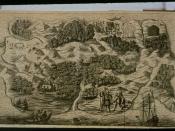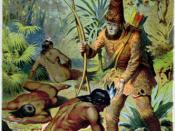In the novel Robinson Crusoe by Daniel Defoe, the protagonist is inspired by a desire to travel and make a fortune. In spite of his father's opposition, Robinson Crusoe runs away to sea. At the beginning of the novel, after Crusoe introduces himself, he establishes his narrative as a memoir of sorts, and we are told that he is looking through more experienced, wise eyes than when he originally experienced his story. He presents events not only from his point of view as a youth but also from a Christian perspective; this is important to note because his discourse is shaded with hindsight and interpreted through a mind that has come to accept Providence's hand in his life. While stranded alone on an island, Robinson Crusoe appears to have a religious epiphany about the role of Providence in his life and resolves to live in accordance with God's will.
By examining the plot and the process of psychological change that Crusoe undergoes, it becomes apparent that he experiences and accepts divine control and this gives him the strength to carry out work that would ensure his survival on the island.
Crusoe's conversation with his father about his leaving home can be interpreted from a religious perspective as well as from an economic perspective. His father, in urging Crusoe to stay in the comfortable position which God has placed him in - the middle class, he is representing an older person's view of a man's duty, which is to accept the lot that God has assigned him in a society where social class is essentially fixed. Crusoe, in contrast, represents a more modern social and economic ideal, for his desire to venture forth and his aspirations to earn more are the characteristics of capitalism (McInelly 85). Crusoe's "original sin"...


